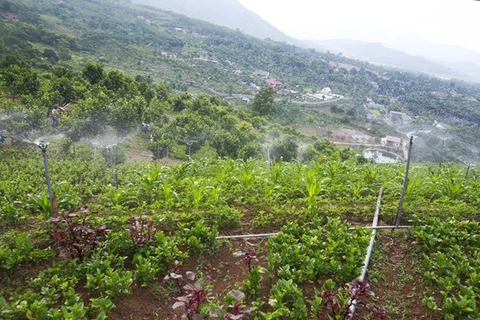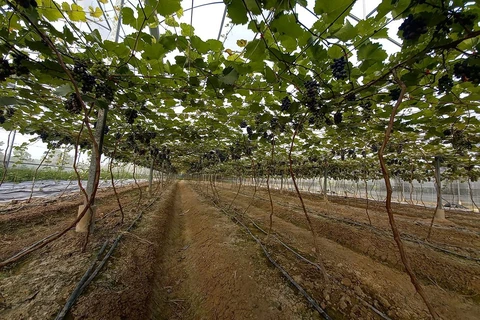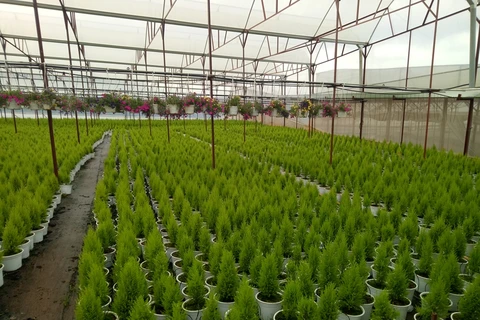 Hanoi’s farmers are using unmanned aerial vehicles to spray pesticides and plant rice to reduce costs and maximise profits. (Photo courtesy of the city's Department of Agriculture and Rural Development) (Photo: VNA)
Hanoi’s farmers are using unmanned aerial vehicles to spray pesticides and plant rice to reduce costs and maximise profits. (Photo courtesy of the city's Department of Agriculture and Rural Development) (Photo: VNA) A smart agricultural model has been adopted in rural districts like Phu Xuyen and Chuong My by the city’s Agricultural Extension Centre under the Department of Agriculture and Rural Development.
The centre has assisted cooperatives in applying hi-tech methods in their production by providing advanced equipment.
This includes unmanned aerial vehicles to assist in seed sowing, fertilising, and spraying pesticides in a safe and simple way; as well as using remote sensing aircraft, and weather monitoring stations to assist in land surveying and mapping.
The smart agricultural model has helped farmers better manage pests and diseases, as well as monitor weather, soil, and water to plan the best care for their plants.
Vu Van Dinh, Director of the Phu Chuyen Agricultural Cooperative in Phu Xuyen district, said technology application in farming requires lots of work in which digitisation and field planning are decisive factors.
We face difficulties, but only a dozen households out of nearly 100,000 oppose field boundary removal to apply modern equipment, he said.
Nguyen Van Ta, who leads the production team of Ha hamlet in Phu Xuyen district's Chuyen My commune, said once the cooperative has applied technology and provided quality agricultural services, farmers only need to check their fields and bring rice back home at the end of the harvesting season. Meanwhile, they have time to do other jobs.
Thanks to that, local farmers can maintain proper crops while being productive in other ways too and improve their livelihoods, he said.
Farmer Duong Dinh Giot from Dong Vinh hamlet, Chuyen My commune, said: “After observing unmanned aerial vehicles operating on the field, we see that the hi-tech application in supervising, pest and disease control, and weather forecasting helps reduce costs and increase profits to farmers.”
“We hope the application will be multiplied in all fields in our area,” he added.
In order to fully cover farming services from watering, in-field irrigation, disease and pest control, and non-stop mechanised planting and harvesting, co-operatives must accelerate the application of hi-tech solutions.
Director of the Phu Chuyen Agricultural Cooperative Vu Van Dinh said in order to master advanced high technology, agricultural cooperatives need capital to buy machinery and equipment and launch training courses to improve farmers’ qualifications.
Hoang Van Tham, Director of Chuc Son Clean Fruit and Vegetable Cooperative in Chuong My district said, human resources are important to agricultural cooperatives to apply advanced technology on a large scale.
Vu Thi Huong, Director of the Hanoi Agricultural Extension Centre, said: “If we want to apply high technology in agriculture, we must start with farmers. Digital technologies must be relevant to conditions, circumstances and characteristics of farmers.”
The centre has linked local authorities, technology suppliers and co-operatives in an effort to promote hi-tech applications.
A number of co-operatives applying high technology have basically met requirements.
They include the Chuc Son Clean Fruit and Vegetable Cooperative in Chuong My district and Huong Ngai Agricultural Cooperative in Thach That district.
These cooperatives have made a digital transformation in agricultural production, better arranging plants, and introducing higher quality varieties. They have also introduced livestock with high productivity into production.
The cooperatives have invested in equipment and machinery to improve productivity and product quality, and gradually expanded production, subsequently increasing their collective incomes.
Nguyen Trong Vinh, Vice chairman of the Phu Xuyen District People’s Committee, said local authorities will assist agricultural cooperatives to gradually make digital transformation on field plots and digitalise land management data, serving as a basis for modern and smart agriculture development.
Deputy Director of the Hanoi Department of Agriculture and Rural Development Nguyen Manh Phuong said Hanoi has a large area of agricultural land, while the agricultural labour force is in shortage due to the labour shift movement to craft villages and the service sector. This leads to an increasing area of abandoned agricultural land.
He said it is necessary to establish co-operatives and groups that apply synchronous mechanisation and high technology in production. This also helps to maintain the national database of agricultural producers, he said./.
VNA






















